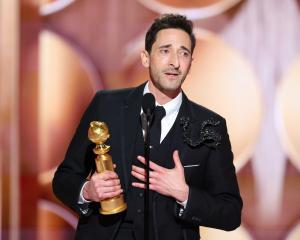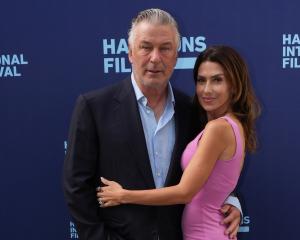
A New Zealand documentary provides space for dissident voices on the Israeli-Palestinian conflict, Tom McKinlay writes.
Everywhere you look in New Zealander Sarah Cordery's film Notes to Eternity, the way forward is blocked.
Her documentary on the situation in Israel and Palestine shows roads cut short by rough piles of rock, barriers of concrete and bulldozed heaps.
In some places the roadblocks are augmented by sandbags and young men with guns.
Most emphatically, Israel's long dividing wall cuts down the options.

But that's not the end of it.
Palestinians scramble over the mounds on foot and head on their way.
They find a crack in the great wall and slip through.
Notes to Eternity does something similar.
As it says on the packet, the film "is a meditation on the Israel-Palestine conflict centring on the lives and ideas of four renowned critics of Israel: Noam Chomsky, Sara Roy, Norman Finkelstein and Robert Fisk''.
The first three are American Jews, Roy and Finkelstein the children of Holocaust survivors.
Chomsky, of course, is the ageing but unbowed champion of dissident opinion.
Fisk is the peerless last word in Middle Eastern journalism.
The documentary was shot over 10 years, and indeed, first-time and untrained film-maker Cordery was still putting the finishing touches on it this week just days before its cinematic release.
It is a big project.
The four protagonists take us on a journey through 20th-century politics, unpacking the waypoints that have led to the now seemingly intractable stand-off between Israel and Palestinian Arabs.
In the late 1990s, Cordery says she had what she describes as an ‘‘inarticulate interest in the aesthetics of landscapes ... but the West Bank in particular encapsulated that for me''.
So the English literature graduate with a nascent interest in film-making found herself in the land, teaching English to pay the bills.
It was clear to her a process of erasure of the Palestinian people from the landscape was going on, scarring the territory as it did so, which led her to take a closer look at the "hyper reality'' of existence there.
"I was quite naive I think when I went over there as to what the political situation was so it was not quite tabula rasa [blank slate] but almost.''
Cordery threw herself into the topic.
At the end of that process she says it is easy to see the situation in simple terms of what is right and what is wrong - elderly Palestinians who cannot get to hospital or tend their olive trees - but a lot of research needs to be done to get to that point.
"I think the mainstream doesn't make that easily available, so it was a process of excavation ... "
I felt that the counter-narrative about the reasons for this conflict, the particulars for the conflict were largely absent when I started looking seriously at the issue.''
Dr Finkelstein, an academic and writer on the Israeli-Palestinian conflict and the Holocaust, provides that narrative most immediately from the occupied territories, where he has been a regular 20-year visitor.
He is now banned from Israel. Both he and Dr Roy, as the children of Holocaust survivors, and Prof Chomsky, make connections between the experience of European Jewry in the 20th century and the lives of Palestinians in the occupied territories today.
Talking to his Palestinian host, human rights advocate Moussa Abu Hashhash, Dr Finkelstein compares what he does, in documenting life in the occupied territories, to the Jews in the Warsaw Ghetto during World War 2 who could do nothing more than record the detail of their fates.
"There was a handful, who just documented, documented, documented. And they knew they were going to die. But they wanted a document and then that's all we have,'' he says in the film.
That is what can be done for now in Gaza and the West Bank "and then another time you do something more'', he says.
Another time he wonders aloud why he has chosen such a hopeless cause.
Prof Chomsky flips it around again discussing the danger of Israel becoming a nation of "Judeo Nazis''.
"As you have your boot on someone's neck, it affects you,'' he says.
For Harvard political economist Roy, a 30-year researcher of the conflict, the reality of the Jewish state means the link between Judaism and Zionism has been broken.
"It is as if our unbending support for Israel's militarism requires putting our minds, as it were, into Auschwitz, where being a Jew puts your existence on the line. To be Jewish means to be threatened, nothing more, hence the only morality we can acknowledge is saving Israel and by extension saving ourselves.''
Between the mostly calm considerations of the three American academics, Fisk provides a more urgent presence, apparently still gripped by all he has seen during a lifetime of reporting the region.
The British journalist walks us through the scene of the 1982 Sabra and Shatila massacres perpetrated by the Lebanese Christian Phalangist militia and remembers describing the massacres to an Israeli soldier at the scene as Treblinka.
There is footage of the massacre and it is grim.
"This was real acts of evil,'' Fisk says, laying responsibility with Israel.
They are strong opinions but argued cogently by keen observers of the region.
Clearly reasonable people have arrived at challenging conclusions.
Dr Roy quotes Chomsky at one point, talking about the "parameters of thinkable thought''.
We're all brought up within certain parameters, she says, and it's up to us whether we stay within them or push beyond.
Part of Roy's raison d'etre in the film, Cordery says, is that the sacred cows of the long-running and highly charged Israeli- Palestinian issue can be approached.
"We should all push at the parameters of thinkable thought.''
However, Cordery concedes that she too regards the situation in the occupied territories as dire.
Her film returns again and again to the creep of Israeli road signs and the brutalist blocks of Israeli settlements.
"I can not see it changing personally but there is awareness, particularly among young Jews, and the Palestinian activist movement is perhaps learning a more effective language. But that's not for me to say. As a film-maker I just presented this story, which is primarily the story of these four people interacting.''
Dr Finkelstein, she thinks, perhaps harbours more hope for the future than his Warsaw comparisons conveys, and Prof Chomsky sounds a note of optimism, declaring that hopelessness is not a position anyone should adopt, particularly in the West where activism is largely unconstrained.
Policies change under pressure, he says.
"We ought to look into the mirror. A hypocrite is someone who is very happy to talk about the mote in his neighbour's eye not the beam in his own eye. Look at yourself.''












